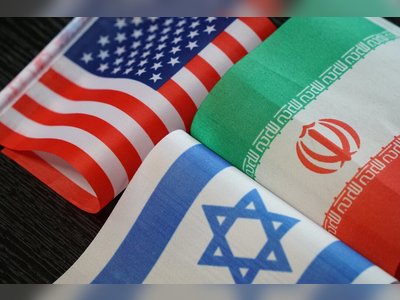
Social media accounts of Rushdie attacker indicate support for Iran’s IRGC
A preliminary review of the social media accounts of the man who attacked novelist Salman Rushdie showed he had sympathies for “Shia extremism” and Iran’s
A preliminary review of the social media accounts of the man who attacked novelist Salman Rushdie showed he had sympathies for “Shia extremism” and Iran’s Islamic Revolutionary Guard Corps (IRGC), NBC News reported on Friday, citing a law enforcement official with direct knowledge of the investigation.
Rushdie, 75, was being introduced to give a talk to an audience of hundreds on artistic freedom at western New York’s Chautauqua Institution on Friday when a man rushed to the stage and lunged at the novelist, who has lived with a bounty on his head since the late 1980s.
Police identified the suspect as Hadi Matar, a 24-year-old man from Fairview, New Jersey, who bought a pass to the event.
The law enforcement official said there were no “definitive links” between Matar and the IRGC but added that a cellphone messaging app belonging to Matar included images of slain IRGC commander Qassem Soleimani and “an Iraqi extremist sympathetic to the Iranian regime,” NBC News reported.
Rushdie has long faced death threats for his fourth novel, “The Satanic Verses,” published in 1988.
In 1989, Ruhollah Khomeini, Iran’s supreme leader at the time, pronounced a fatwa, or religious edict, calling upon Muslims to kill Rushdie and anyone involved in the book’s publication for blasphemy.
Iranian organizations, some affiliated with the government, have raised a bounty worth millions of dollars for Rushdie’s murder. Khomeini’s successor as supreme leader, Ali Khamenei, has reaffirmed the fatwa on multiple occasions, most recently in 2019 through his Twitter account.
Iran’s IRGC-affiliated Fars News Agency and other news outlets donated money in 2016 to increase the bounty by $600,000. Fars called Rushdie an apostate who “insulted the prophet” in its report on Friday’s attack.
Rushdie, 75, was being introduced to give a talk to an audience of hundreds on artistic freedom at western New York’s Chautauqua Institution on Friday when a man rushed to the stage and lunged at the novelist, who has lived with a bounty on his head since the late 1980s.
Police identified the suspect as Hadi Matar, a 24-year-old man from Fairview, New Jersey, who bought a pass to the event.
The law enforcement official said there were no “definitive links” between Matar and the IRGC but added that a cellphone messaging app belonging to Matar included images of slain IRGC commander Qassem Soleimani and “an Iraqi extremist sympathetic to the Iranian regime,” NBC News reported.
Rushdie has long faced death threats for his fourth novel, “The Satanic Verses,” published in 1988.
In 1989, Ruhollah Khomeini, Iran’s supreme leader at the time, pronounced a fatwa, or religious edict, calling upon Muslims to kill Rushdie and anyone involved in the book’s publication for blasphemy.
Iranian organizations, some affiliated with the government, have raised a bounty worth millions of dollars for Rushdie’s murder. Khomeini’s successor as supreme leader, Ali Khamenei, has reaffirmed the fatwa on multiple occasions, most recently in 2019 through his Twitter account.
Iran’s IRGC-affiliated Fars News Agency and other news outlets donated money in 2016 to increase the bounty by $600,000. Fars called Rushdie an apostate who “insulted the prophet” in its report on Friday’s attack.











